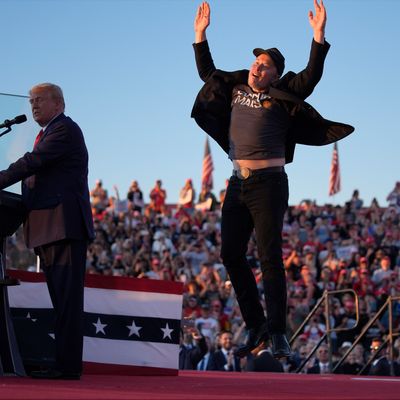
As Elon Musk moves further and further to the right, he clings ever more closely to Donald Trump. He’s campaigning for Trump, once jumping onstage in the grip of ecstasy, and is helping the former president get out the vote. The mogul has pledged his remaining star power — and a slice of his fortune — to Trump’s cause. Earlier this month, Musk announced that he would give away $1 million a day to registered voters in swing states. “We want to try to get over a million, maybe 2 million, voters in the battleground states to sign the petition in support of the First and Second Amendment … We are going to be awarding $1 million randomly to people who have signed the petition, every day, from now until the election,” he said in Harrisburg, Pennsylvania.
CNN reported that Musk referred to a petition “launched by his political-action committee affirming support for the rights to free speech and to bear arms,” and the giveaway is only available to voters in the states of Pennsylvania, Georgia, Nevada, Arizona, Michigan, Wisconsin, and North Carolina. Musk’s gambit may not be entirely legal, experts told CNN. Whether the giveaway meets the legal definition of vote-buying or not, it reveals a deeper hostility to democratic processes on the part of its funder. All wealthy donors want to tip the scales in their candidate’s favor, but Musk is more blatant than most. The SpaceX founder believes voters can be bought, which undermines the democratic system.
Musk’s disregard for healthy democratic activity is in keeping not only with his personal shift to the right but with Silicon Valley’s growing support for conservative figures and causes. Once known for his environmental concern, and for hazy dreams of colonizing Mars, Musk has added a hostility toward government regulation, fellow immigrants, and “wokeness” that has made him a right-wing celebrity. Though he pretended in public to hold a form of political neutrality as recently as March, Reuters has reported that he donated to a conservative group, Building America’s Future, years before he endorsed Trump. According to The Wall Street Journal, Musk donated millions in 2022 to a group called Citizens for Sanity, which used the funds to run television ads attacking Democrats for immigration and medical care for trans youth. He donated another $10 million to Florida governor Ron DeSantis in 2023 as the Republican ran unsuccessfully for president. Musk’s donations are relatively normal activity for a conservative megadonor, but they help establish a pattern. Musk’s shift to the right — accompanied by public rants about trans people and immigrants — led him inexorably to the same anti-democratic place that now unites much of the conservative movement. With few exceptions, conservatives are locked in for Trump, who won’t accept the results of the 2020 election, has said he’ll pardon January 6 rioters who wanted to perpetrate a coup, and is preparing to challenge the 2024 election should he lose.
Musk shares that anti-democratic tendency with other tech moguls. As the New York Times has reported, a tight-knit MAGA circle in Silicon Valley has gathered around figures like the far-right billionaire Peter Thiel, who wrote in 2009 that he no longer believed “that freedom and democracy are compatible” and that “the great task” for libertarians like himself is to “find an escape from politics in all its forms.” Since then, Thiel has, of course, become deeply involved in politics; his former protégé, J.D. Vance, is now a senator in Ohio and Trump’s running mate. Thiel donated millions to Vance’s Senate campaign, thus elevating a self-described “post-liberal” who has said, falsely, that Trump did not lose the election to Joe Biden in 2020. Other MAGA devotees include Joe Lonsdale, a Palantir founder who used his immense fortune to help start the University of Austin and a conservative think tank called the Cicero Institute. Lonsdale has been a conservative for a long time, as the Times noted; others are more recent converts. Venture capitalists Marc Andreessen and Ben Horowitz became disillusioned with the Democratic Party over anti-trust enforcement and Biden’s proposed “billionaire’s tax.”
Silicon Valley’s right-wing megadonors aren’t just opposed to Democratic Party policies. Trump’s anti-democratic qualities may also prove to be a key part of his appeal. The Times observed that many conservative Silicon Valley figures including Thiel are close to Curtis Yarvin, a leading architect of the new right who sees democracy as “destructive” and has said that Americans should “get over their dictator phobia.” Trump, who routinely praises dictators around the world, might agree.
In Trump, tech moguls like Musk see a champion, a strongman who would not only protect but grow their collective power. They backed him as he and his campaign denied the results of the 2020 election and, as ABC News reported, “threatened to prosecute election workers” while claiming, falsely, that Democrats are importing non-citizens so they can vote for Vice-President Kamala Harris.
Given this context, it’s little surprise that Musk thinks he can bypass normal democratic processes in order to reward voters who agree with him. He may even get away with it. Musk and his collaborators fear a loss of authority, but they shouldn’t. Even if Harris defeats Trump, her courting of the business community suggests they might not have much to fear from her administration. In American politics, wealth often wins.






























